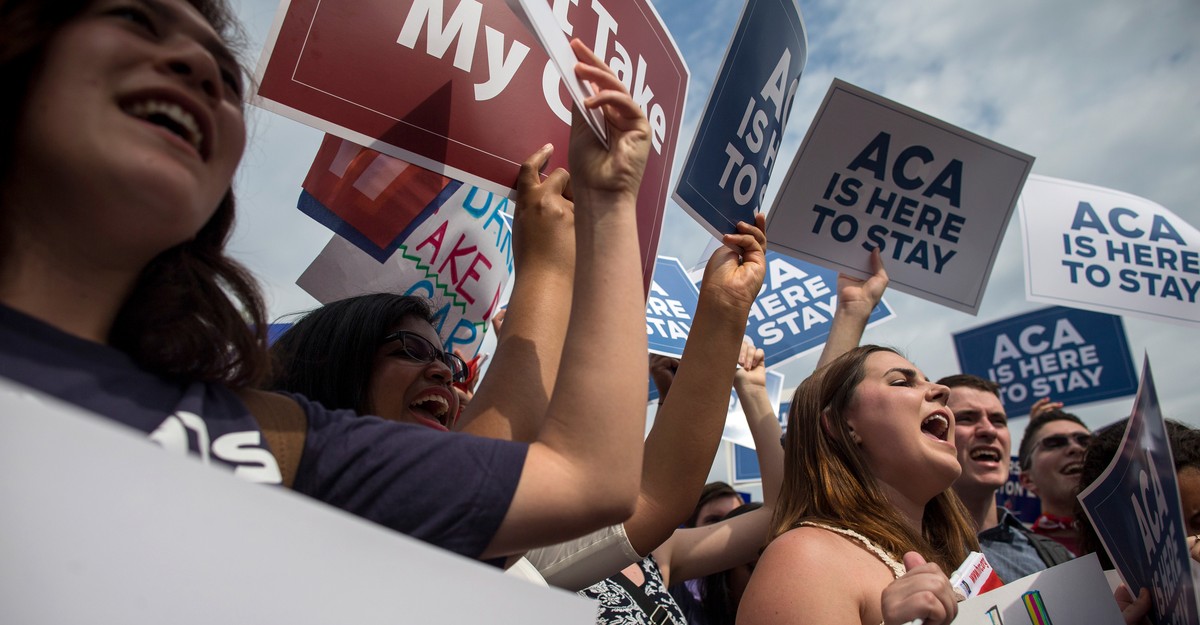Donald Trump’s renewed pledge on social media and in campaign rallies to repeal and replace the Affordable Care Act has put him on a collision course with a widening circle of Republican constituencies directly benefiting from the law.
In 2017, when Trump and congressional Republicans tried and failed to repeal the ACA, also known as Obamacare, they faced the core contradiction that many of the law’s principal beneficiaries were people and institutions that favored the GOP. That list included lower-middle-income workers without college degrees, older adults in the final years before retirement, and rural communities.
In the years since then, the number of people in each of those groups relying on the ACA has grown. More than 40 million Americans now receive health coverage through the law, about 50 percent more than the roughly 27 million the ACA covered during the repeal fight in 2017. In the intervening years, nine more states, most of them reliably Republican, have accepted the law’s federal funding to expand access to Medicaid for low-income working adults.
…
Every alternative that Republicans proposed during the Trump years sought to lower premiums by unraveling the ACA provisions that required more sharing of risks and costs. For instance, the House GOP plan allowed insurers to charge seniors five times as much as young people, reduced the number of guaranteed essential benefits, and allowed states to exempt insurers from the requirement to cover all applicants with preexisting health conditions.
…
Another big beneficiary from the Medicaid expansion was rural communities, which have become more reliably Republican in the Trump years. Expanding access to Medicaid was especially important to rural places because studies have consistently found that more people in those areas than in metropolitan centers suffer from chronic health problems, while fewer obtain health insurance from their employer, and more lack insurance altogether.
The increased number of people covered under Medicaid gave rural hospitals a lifeline by reducing the amount of uncompensated care they needed to provide for patients lacking insurance. “When you go out to the rural areas, frankly most hospital executives, like other business people, they tend to be pretty conservative,” Timothy McBride, a co-director of the Center for Advancing Health Services, Policy & Economics Research at Washington University in St. Louis, told me. “And they don’t like government intervention. But I would go to see these people and they would say, ‘I’m for Medicaid expansion,’ because they had to deal with the uninsured.”
I hate to say it but after viewing his supporters actions I really don’t care what happens to them anyone. How long should I be tolerant or concerned about awful people? I have no compassion left for shit humans
Aren’t Republican voters usually the victims of Republican policies?
They always are the collateral damage. It’s a terrible thing, really. The poor people just keep voting against their own self-interest because they believe the lies of career grifters.
Face it, the teabagger fanbois hate ACA (“Obamacare”) because Obama is Blah and donnie hates it for the same reason AND the fact that he got owned by Obama at that correspondent’s dinner and everyone laughed at his stupid racist ass.
The fact that ACA actually helps people - including themselves - escapes them.
Only the poor, stupid, desperate ones who still hope his policies will save them. I.e. you know, most of them. The rich ones will just sail like they always do. Reality of the electorate.
deleted by creator





